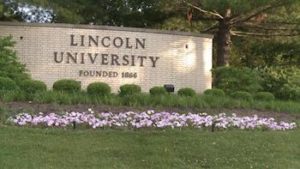
*Lincoln University of Missouri began classes on this date in 1866—one of over 100 Historically Black Colleges and Universities in America (HBCU).
At the close of the American Civil War, soldiers and officers of the 62nd United States Colored Infantry, stationed at Fort McIntosh, Texas, but composed primarily of Missourians, took steps to establish an educational institution in Jefferson City, Missouri, which they named Lincoln Institute. The following stipulations were set for the school:
1. The institution shall be designed for the special benefit of the freedmen;
2. It shall be located in the state of Missouri;
3. Its fundamental idea shall be to combine study and labor. Members of the 62nd Colored Infantry contributed $5,000, supplemented by approximately $1,400 given by the 65th Colored Infantry. On January 14, 1866, Lincoln Institute was formally established under an organization committee.
It was incorporated by June of the same year, and the committee became a Board of Trustees. One of the founders was Rev. John B. Meachum. Richard Baxter Foster, a former first lieutenant in the 62nd Infantry, was named the first principal of Lincoln Institute. On September 17, 1866, the school opened its doors to the first class in an old building in Jefferson City. In 1869, the Lincoln Institute relocated to its present campus, and in 1870, it began receiving state aid for teacher training from Missouri. College-level work was added to the curriculum in 1877, and the Normal School Law passage permitted Lincoln graduates to teach for life in Missouri without further examination. Lincoln Institute formally became a state institution in 1879 by deeding the property to the state.
Under the second Morrill Act of 1890, Lincoln became a land grant institution, and the following year, industrial and agricultural courses were added to the curriculum. In 1921, the Missouri Legislature passed a bill introduced by Walthall M. Moore, the first Black to serve in that body, which changed the name from Lincoln Institute to Lincoln University and created a Board of Curators to govern the University. The North Central Association of Colleges and Secondary Schools accredited the high school division in 1925, the teacher-training program in 1926, and the four-year College of Arts and Sciences in 1934.
Graduate instruction was begun in the summer session of 1940, with majors in education and history and minors in English, history, and sociology. A School of Journalism was established in February 1942. Twelve years later, the United States Supreme Court passed its Brown v. Board of Education ruling. Lincoln University responded by opening its doors to all, meeting its entrance criteria.
Today, Lincoln University serves a diverse student clientèle, both residential and non-residential, engages in various research projects, and offers numerous public service programs and an array of academic programs. Notable Alumni include Melvin Tolson, M. Carl Holman, and others.
Black American Colleges and Universities:
Profiles of Two-Year, Four-Year, & Professional Schools
by Levirn Hill, Pub., Gale Group, 1994
ISBN: 0-02-864984-2